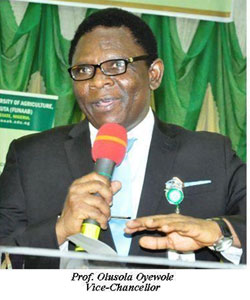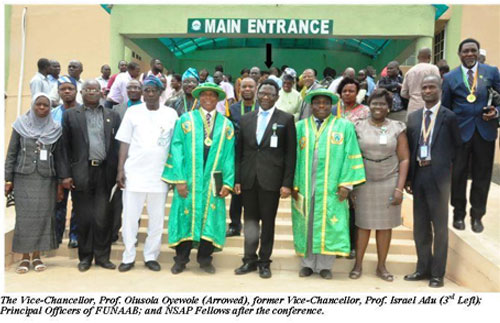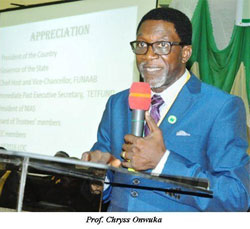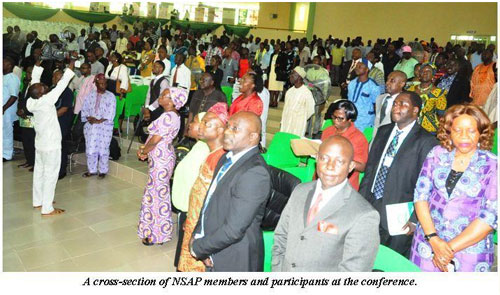
Increasing ambient temperature is capable of bringing about low Voluntary Feed Intake (VFI), depressed weight gain, low lactation yield, increased disease incidence, as well as depressed fertility, while decreasing precipitation in the Sahel is likely to lead to a decline in pasture yield, reduced water availability and increased livestock mortalities. This was the submission of a retired don in the University’s Institute of Food Security, Environmental Resources and Agricultural Research (IFSERAR), Professor Olusegun Osinowo, in a joint paper presentation with Dr. Monsuru Abioja, an Environmental Physiologist in the Department of Animal Physiology of FUNAAB, during the 41st Annual Conference of the Nigerian Society for Animal Production (NSAP), hosted by the University and themed, “New Technologies for Enhanced Animal Production in Nigeria”.

Professor Osinowo, who with Dr. Abioja, delivered a plenary session at the occasion titled, “Mitigating the Effects of Global Climate Change on Animal Production in Nigeria”, in line with the Inter-governmental Panel on Climate Change (IPCC), described climate change as an alteration in the state of the climate that could be identified, using statistical tests, through changes in the mean or the variability of its properties that could persist for an extended period, typically for decades or longer. He noted that it also refers to any change in climate over time, whether due to natural variability or as a result of human activity. He stated further that climate change leads to unequivocal and persistent rise in global temperature, sea level and fall in northern hemisphere snow cover, adding that climate change also arises from global warming, adding that the drivers of climate change are Greenhouse gases and Aerosols.

They, however, stressed the effects that climatic change can have on animal productivity, saying that when climatic conditions go beyond the comfort zone of livestock, reduced growth rate, prolonged time to reach puberty, low milk yield per lactation, reduced fertility, depressed libido in male and reduced length of oestrus in female animals result. Others are slow return to oestrus and conception after weaning, increased embryonic mortality, reduced feed utilization and increased morbidity and mortality. They further highlighted the mitigation process to be observed to avert the intensity of climatic change to include, biogas production, breeding for low-CH4 emission and heat-tolerant animals, as well as feed/nutrient manipulations.
Speaking at the event, the Vice-Chancellor, Professor Olusola Oyewole, recalled that in 1998, NSAP held its Silver Anniversary Conference alongside the Inaugural Conference of the West African Society for Animal Production in Abeokuta. Professor Oyewole lauded the Society for promoting all aspects of animal production by providing a forum for discussing scientific, social and editorial problems relating to the development of animal production in Nigeria. Emphasising the greatness of the University as the Best University of Agriculture in Nigeria, the Vice-Chancellor said FUNAAB is a World Bank Centre of Excellence in Agriculture, adding that “We are proud to say this many times and I would repeat again, this University is proud to note that we have the highest number of animal scientists in the Nigerian University system and it is, therefore, not surprising that FUNAAB was designated as a Centre of Excellence in Animal Breeding and Genetics by the Nigerian Institute of Animal Science (NIAS)”.
The Vice-Chancellor, who is also the President, Association of African Universities (AAU), noted the importance and timeliness of the theme for the conference, which took into consideration, the various challenges facing animal production in Nigeria. He disclosed that the challenges include shortage of feed supplies, inadequate breeding programmes for all classes of livestock and inadequate pasture breeding programmes resulting in over-reliance on natural pastures. Others are: wastages arising from diseases and pest infestation, lack of adequate use of artificial insemination, inconsistent national policy on animal production and related areas, saying further that if these challenges were addressed, they would go a long way in enhancing animal production in Nigeria.

The President of NSAP, Professor Chryss Onwuka, said the theme of the conference was guided by the Society’s need to be up-to-date as well as use the recent advances in the field to increase productivity. Professor Chryss Onwuka, a former Deputy Vice-Chancellor (Academic) of FUNAAB, regretted that food was disappearing from the tables by the day, adding that the purchasing power was also dwindling in a dollar denominated Nigerian economy. He, however, made a clarion call for the Society to pull its resources and efforts together to rebuild the nation’s livestock industry for a more sustainable development. He further stated that, “increased livestock production in Nigeria is still hampered by low level of technical input, poor capacity utilisation, low investment, as well as high production cost, high cost of credit, inflation, among other factors. Professor Onwuka hoped that the outcome of the conference would enhance the available technologies for livestock production, as well as transform the lives of Nigerians that depend on the livestock sector. He noted that the journey towards food self-sufficiency in Nigeria required committed contributions from everyone.
Delivering his keynote address, the immediate past Executive Secretary, Tertiary Education Trust Fund (TETFund), Professor Suleiman Bogoro, noted the pivotal role livestock played in contributing to the security of lives of the poor, saying that the consumption of animal products in developing countries was low. According to him, “while people in developed countries obtain on average 27 per cent of their energy and 56 per cent of their protein from animal products, people in developing countries obtain only 11 and 26 per cent, respectively”. He added that the analysis of trends in consumption levels predict rapid growth of 2.8 and 3.3 per cent annually up till 2020, for meat and milk in the developing countries.
Bogoro, a Professor of Animal Science at the Abubakar Tafawa Balewa University (ATBU), Bauchi, said these identified efforts needed to be backed-up with the necessary awareness and campaigns, stressing that the School Milk Programme, supported by a number of governments, non-governmental and multilateral development agencies, was one of such initiatives because the programme was aimed at building a milk-drinking culture among the future generations. Professor Bogoro recommended that what was needed was more investment in livestock research and development from the standpoint of pro-poor and agribusiness, adding that massive development of grazing reserves to settle itinerant livestock owners in areas, where there would be minimal conflict with land owners, should be encouraged. He further stated the imperative of aggressive investment into the development of dairy and beef industries as well as the need for the strengthening of pasture production, as a national policy, by supporting all categories of domestic ruminant animal farmers. He added that government should view agriculture both as a business and as a developmental programme by creating incentives for prospective producers.

Highpoint of the ceremony was the decoration of two of the Society’s distinguished Professors, namely: Christian Ikeobi, the immediate past Dean, College of Animal Science and Livestock Production (COLANIM) of FUNAAB and Barinene Fakae, the immediate past Vice-Chancellor of the Rivers State University of Science and Technology (RSUST), Port Harcourt, with the highest honour of the Society, which is the Fellowship of the Nigerian Society for Animal Production (FNSAP), as the 32nd and 33rd Fellows. Dignitaries present at the event included a former Vice-Chancellor of FUNAAB, Professor Israel Adu; the immediate past President of NSAP, Professor Udo Herbert; the Vice-Chancellor, Mcpherson University, Professor Adeniyi Agunbiade; and another plenary speaker, Chief (Dr.) Simeon Owhofa, Managing Director, Nutrivitas Nigeria Limited, who delivered a lecture titled, “Enhancing Animal Production and Food Security in Nigeria”.
